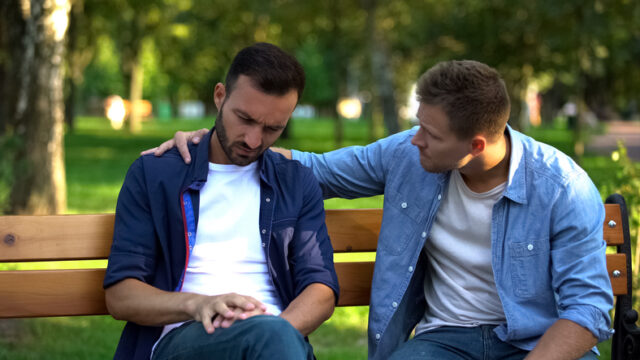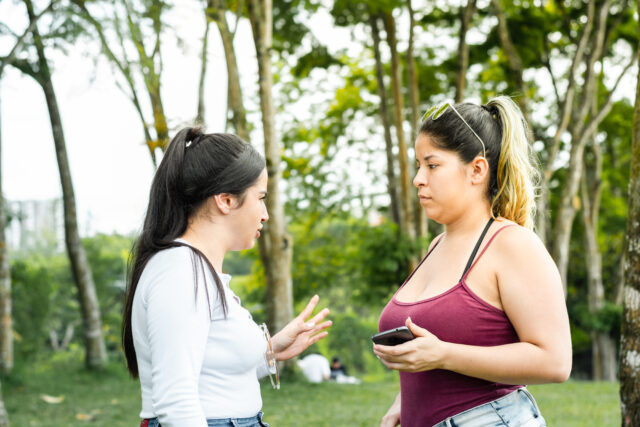Generally speaking, friendship should feel supportive, equal, and freeing.

It shouldn’t feel like you’re constantly responsible for someone else’s emotions or like your whole identity is tied to the dynamic. However, in some friendships, things slowly (or quickly!) slip into codependent territory. It doesn’t always seem toxic or unhealthy from the outside, but you might feel drained, guilty, or stuck. Here are some signs the friendship might be more codependent than balanced.
1. One of you can’t make a decision without the other.

If your friend can’t choose what to do, how to feel, or whether something’s okay unless they run it by you first, that’s not just closeness—it’s emotional over-reliance. They lean on you like you’re their moral compass, therapist, and life coach all in one. It might feel flattering at first, but eventually, it starts to weigh on you. You feel responsible for their choices, and if something goes wrong, you might even get blamed, even if you never asked for that role.
2. You feel guilty when you need space.

Healthy friendships can handle breaks, boundaries, and alone time. But in a codependent dynamic, asking for space feels like betrayal. Your friend might take it personally, withdraw, or guilt-trip you for needing time to yourself. It creates a subtle pressure to always be available, even when you’re burnt out. Eventually, that guilt turns into resentment, even if you still care about them deeply.
3. Your mood depends on theirs.

If they’re upset, you feel responsible. If they’re stressed, you take it on. Their emotional state becomes something you constantly track, manage, and try to fix, even at the cost of your own peace. That level of emotional entanglement might feel like closeness, but it’s actually a sign your boundaries are blurred. You start absorbing their feelings instead of just being there to support them.
4. You’re always the one doing the emotional heavy lifting.

You’re their go-to for every vent, crisis, or emotional wobble, but when you need support, they’re either unavailable or quickly flip the focus back to themselves. The friendship runs one way more often than not. Codependency thrives on imbalance. You feel needed, but not necessarily supported. That dynamic becomes exhausting when your own needs are regularly put on hold.
5. You feel anxious when they’re upset with you.

In a healthy friendship, conflict doesn’t feel world-ending. However, in a codependent one, even a small disagreement can send you into panic mode. You worry they’ll cut you off, spiral, or punish you with silence. This makes you tiptoe around your own boundaries just to keep the peace. Before you know it, you’re walking on eggshells in a friendship that’s supposed to feel safe.
6. They expect you to always prioritise them.

If you make plans with other people, need a weekend to yourself, or don’t reply fast enough, they act hurt or distant. Their sense of closeness hinges on you choosing them—every time. This can lead to a warped dynamic where your time, attention, and energy are constantly under pressure. You feel more like their lifeline than their friend.
7. You feel drained after spending time together.

Friendship should leave you feeling good, not like you’ve just done emotional CPR. If every catch-up feels like a therapy session where you have to keep them afloat, that’s a red flag. It doesn’t mean they’re a bad person, but if the friendship consistently leaves you emotionally depleted, something in the dynamic is out of balance.
8. You hide your real feelings to protect them.

You downplay your wins, avoid sharing hard truths, or keep things to yourself because you know they’ll either take it badly or make it about them. You start editing yourself to manage their emotional reactions. This creates a version of the friendship where honesty takes a back seat. You stop being fully yourself—not because you want to lie, but because honesty feels too risky.
9. They rely on you for constant reassurance.

No matter how many times you tell them they’re loved, worthy, or not doing anything wrong, they need to hear it again five minutes later. Your reassurance becomes a loop, and it never really lands. The constant emotional upkeep isn’t sustainable. It creates a cycle where their self-worth depends on you, leaving you feeling more like a caretaker than a friend.
10. You’re scared of what would happen if you pulled back.

You’ve thought about stepping back from the friendship, but you worry what it would do to them. Maybe you feel like they’d fall apart, or that you’d feel too guilty to cope. That fear isn’t random. It usually means the friendship is holding emotional weight it was never meant to carry. You’re not just showing up; you’re holding everything together.
11. There’s no room for your other relationships.

They get weird if you spend time with other friends. They want to know what you said, what you did, or why you didn’t invite them. It’s subtle, but you can feel the possessiveness creeping in. As time goes on, your world starts shrinking around them. And while it might feel like loyalty, it’s actually a kind of emotional dependence that makes it harder to maintain balance with the rest of your life.
12. You constantly feel responsible for their happiness.

Every time they’re upset, you feel like you’ve done something wrong, or you jump into problem-solving mode like it’s your job to make everything better. This isn’t just empathy, it’s overfunctioning. That usually means the friendship has tipped from mutual support into emotional codependency, where their well-being becomes your burden.
13. You don’t feel free to be yourself anymore.

Somewhere along the way, the friendship stopped feeling easy. You’re not sure when it changed, but now you feel like you have to manage their emotions, censor your own, and show up even when you’re exhausted. That loss of freedom is the clearest sign of all. A healthy friendship feels like a place to exhale. A codependent one starts to feel like a performance you have to keep up—just to keep things from falling apart.




